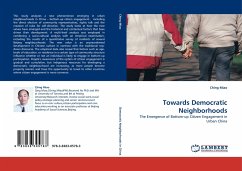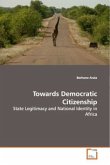This study analyzes a new phenomenon emerging in urban neighbourhoods in China bottom-up citizen engagement including the direct election of community representatives, rights talk and the creation of rules for self-direction. The study looks at how the new values have emerged and the historical and contextual factors that have driven their development. A multi-level analysis was employed in combining a socio-cultural analysis with an empirical examination, including the results of a quantitative survey of residents of several Beijing neighbourhoods. The new value is an unprecedented development in Chinese culture in contrast with the traditional top-down discourse. The empirical data also reveal that factors such as age, levels of education, or residence in a certain type of community structure influence whether or not an individual is likely to engage in bottom-up participation. People s awareness of the option of citizen engagement is gradual and cumulative, but indigenous resources for developing a democratic neighbourhood are increasing, as more people become property owners and have the opportunity to travel to other countries where citizen engagement is more common.
Bitte wählen Sie Ihr Anliegen aus.
Rechnungen
Retourenschein anfordern
Bestellstatus
Storno








